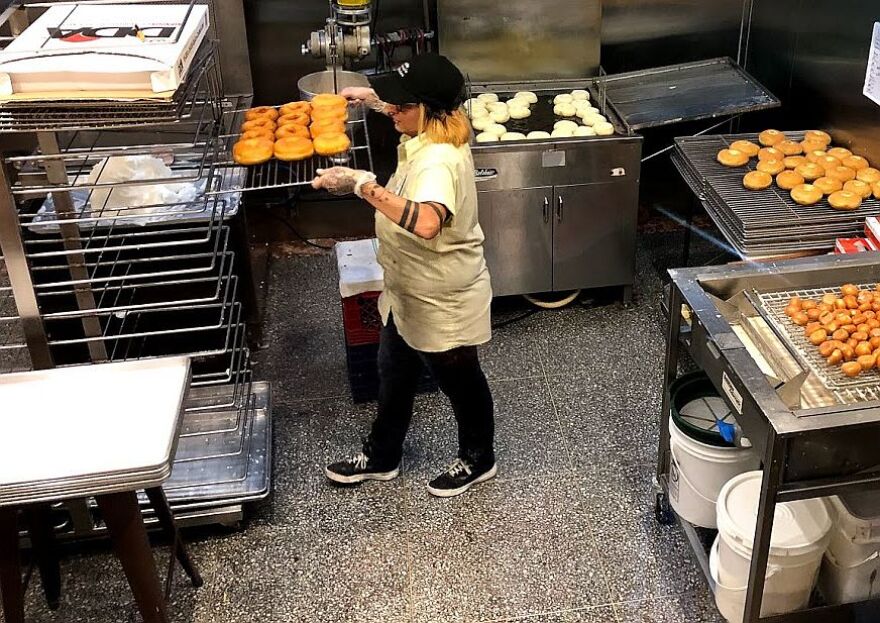Across the U.S., businesses are trying to relaunch. And some are having trouble getting their former employees back.
A federal stimulus package signed off on in March added $600 to weekly unemployment checks. For many minimum and low-wage workers, that's resulted in them making more money staying at home than being back in their old jobs. Critics say this disincentivizes the labor force, at a time when the economy is struggling. Workers-rights advocates counter that safety is more likely a factor, arguing it took a pandemic to create a livable wage.
Politics aside, we look at the basics of this adjusted unemployment benefit, which ends in late July. KLCC's Brian Bull talks to Gail Krumenauer, Oregon's employment economist.
Bull: So first off Gail, have you yourself heard of managers and bosses having trouble getting former staff back on the payroll?
Krumenauer: Directly I have not, I have heard through others, that they’ve been hearing either through media outlets or other organizations. I have heard some initial reports that there may be some employers who are experiencing difficulty having employees come back to work as businesses start to reopen across Oregon.

Bull: What conditions allow an Oregon worker to continue unemployment benefits during this pandemic?
Krumenauer: There may be some conditions as businesses reopen that prohibit workers from being able to return to the job when they are called back to work. We have a set of temporary rules in place, the Oregon Employment Department, that acknowledges the realities of COVID-19 and the associated situations that could affect workers and employers. And those include things like someone might be called back to work and they may be unable to return to work because they have COVID-19. Or because they are directly caring for someone and are the sole caretaker for someone who has COVID-19, or has been required to quarantine for COVID-19.
In addition, there are some workers who may be called back to work and may actually have to be on a work site and may be the sole caretaker for children whose schools are closed and don’t have any daycare options. Those are the types of things that create situations where workers are unable to return to work even when they are called back.

One of the other things too note in terms of continuing to receive benefits when called back to work, there are some cases that I have heard of as well, where employers are reopening and they’re calling back their employees. It’s for a real limited schedule though.
Say somebody was working 40 hours a week but now they’re only working maybe 10 hours a week. And I know there are people who are afraid if they go back to work at all, they’re going to lose all their benefits even on those really reduced schedules.

And there is information at: Oregon.gov/employ, we have a frequently asked questions guide that talks about situations where people may still be able to claim benefits even when they return to work if it’s on these really limited schedule situations.
If the earnings are so low, you may still be able to receive your regular unemployment benefits and for anybody who is receiving unemployment benefits and are eligible for the weeks between March 29th and July 25th they’re also receiving that additional $600 payment.
Bull: Now a manager can’t determine themselves if an employee is eligible or not for continued employment benefits, correct?
Krumenauer: That is correct. That determination need to be made by the Oregon Employment Department, because each individual’s case is just that, it’s individual.
The first thing we request that people do is go to our COVID-19 page, at Oregon.gov/employ, and there we do have a resource guide specific to resuming operations but talks about some of these situations where workers may continue to be eligible to receive unemployment benefits even as the business reopens. So we encourage that as a first opportunity to take a look at the types of situations that could be affecting workers as businesses reopen.

In addition to that, yes, we do have in that same resource guide a link to information where if anyone is intentionally misrepresenting their situation in order to receive unemployment benefits, that information can be reported and would be investigated.
Bull: Gail Krumenauer is Oregon’s Employment Economist. Gail, thank you so much for your time.
Krumenauer: Thanks for having me join you today.
Bull: And stay tuned to KLCC for further coverage of the COVID-19 pandemic. For KLCC News, I’m Brian Bull.
Related Links
* COVID-19 specific page on Oregon Employment Department's website
* Eligibility for Oregon Unemployment
Copyright 2020, KLCC.








